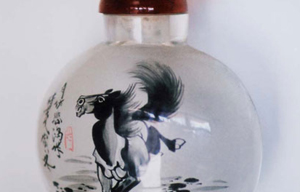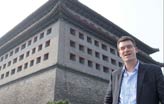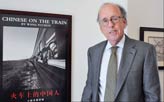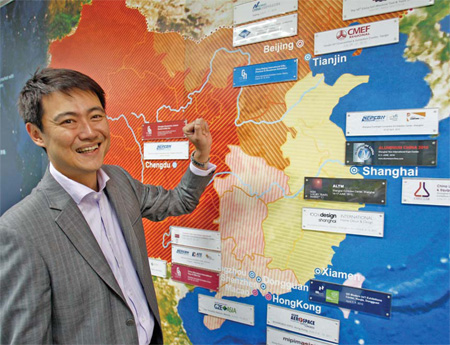Expo paradigms get a shake-up
Updated: 2011-09-23 08:35
By Patrick Whiteley (China Daily)
|
Edwin Tan from Reed Exhibitions believes China's exhibition industry in the next five years will see an annual growth of 15-20 percent. Zhang Wei / China Daily |
Exhibitions chief says the days of incentive travel trips are over and it is now all about business
Staging an exhibition does not require the skills of a rocket scientist, says Edwin Tan, a senior executive with Reed Exhibitions Greater China. "Really, there's not much to it. All I need to do is to pick up the phone and say, 'I've got an exhibition, this guy has some things to show you, so come along."
But when more than 3,500 official exhibitions are being staged across China, trade fair organizers need to do more than just book a hall and make a few phone calls.
They need to set up successful matchmaking platforms, which deliver profitable contacts and content for exhibitors and the increasing number of foreign visitors coming to China's busy trade fairs.
In such a crowded market, exhibition organizers, like Reed, are under enormous pressure to perform.
"Today you may want to go to a machinery expo but there are probably 1,000 such shows in China and a company like Siemens may ask, 'Which one do I attend?'," Tan says. "All the marketing materials are the same and say 'My show is the best' so a lot of companies go to the show. But if they don't get the return on the investment they will not turn up again.
"And as time goes by you'll find that the weaker shows that don't offer the value they promised will disappear."
Last year Reed events attracted 28,000 suppliers, 600,000 visitors, and about 20,000 conference delegates and this year the British company is on course to stage 55 events specializing in nine industries. Tan says the company's electronics event is the longest-running electronics show in China, while its machinery expo is a big event in Beijing.
"Through the economic crisis, Reed still grew by about 10 percent, but in the past four years our compound growth has been slightly more than 20 percent," Tan says.
Tan, vice-president of business development and projects, and director of Reed Lixin (Shanghai), one of Reed's six Chinese member companies, says China's exhibition industry in the next five years is expected to see an annual growth of 15-20 percent.
But tough economic times are changing the nature of foreign business trips to China.
He says Western exhibitors and visitors are more interested in the business of buying and selling, rather than the pleasure of visiting the Great Wall and the Forbidden City.
"In the past a lot of companies would send sales people and it would become half sales and half incentive trips. But in this new world, everybody is cost cutting and it has to be about getting a return on your investment.
"If they are shipping machinery half way across the world and sending five people they need to do actual work, see actual visitors and get actual business done.
"China is not a new destination for many exhibitors so we never hear them say we are bored, as a China exhibition is a destination to secure sales."
But "for family men who travel all the time, a business trip is not a lot of fun. When you have a wife and kids, most of them don't want to leave home. And they don't enjoy spending all that time at airports and on planes."
The 43-year-old father of two can relate. Before Singapore-born Tan joined Reed in 2007 he was a high-flying executive in the pharmaceutical and publishing industries.
After gaining his higher education in Australia and England he started his career in 1995 in Singapore in pharmaceutical sales. He later moved into printing, joining Singapore's National Printers and worked his way to the New York office as head of global sales. Tan took a leading role as the company expanded its production facilities into China and Southeast Asia.
In 2004 he started his own printing company in Thailand specializing in children's books and three years later, when it was turning over $30 million (22 million euros) a year, he put it on the market. His timing was fortuitous.
In 2007 he joined Reed but after enjoying the freedom of running his own operation, he initially questioned whether he could adjust to a new corporate environment.
"But I discovered that Reed allows a lot of entrepreneurship, and was undergoing a period of big growth and wanted to go into partnerships," he says. "My background of acquiring a lot of factories in the past and being exposed to southern China was good experience."
Tan moved back to Singapore to Reed's regional head office before moving to Beijing in 2009 in the middle of the financial crisis. Despite the global economic gloom, Reed could see bright hopes for China's exhibition market because it was still growing and joint venture opportunities were ripe.
"There was an awareness among our joint venture partners that they had reached a certain level and if they wanted to grow they needed structure and certain processes to get there. They realized that if they developed them on their own it would be longer and harder.
"Our JV partners have seen Reed shows and see something they want but will take a longer time to develop.
"They have certain connections and don't want to sell off their company totally, so that's when a partnership can work."
To improve the quality of his company's events, Tan and his team visit exhibitions and gather feedback from the exhibitors.
"Firstly, I look at the big picture and ask: what is this exhibition about? I look at the positioning and look at what the exhibitors are trying to do. I look at the exhibitor's profile and see if they are limiting themselves to this size or have expanded themselves so wide. What are they here for and what can we do to deliver what they want?"
There are also other issues, such as waiting times in queues, clear signage, layout order and easy access to essential services, such as bathrooms, which when done wrong really irk the participants.
Tan says the exhibition growth outside the major cities is very encouraging.
"It brings in a lot of visitors and with that a lot of money spent in the city, and this multiplying effect goes on and on to taxi drivers, five- and four-star hotels and restaurants.
"It's coming around especially in the second-tier cities, Chengdu or Chongqing, and we are more than happy to help. We sit on the advisory board of Chongqing because if local governments want to build an exhibition hall we know what we want to do in an exhibition hall."
(China Daily 09/23/2011 page6)
E-paper

The snuff of dreams
Chinese collectors have discovered the value of beautiful bottles
Perils in relying on building boom
Fast forward to digital age
Bonds that tie China. UK
Specials

Let them eat cake
Cambridge University graduate develops thriving business selling cupcakes

A case is laid to rest
In 1937, a young woman'S body was found in beijing. paul french went searching for her killer

Banking on change
Leading economist says china must transform its growth model soon

